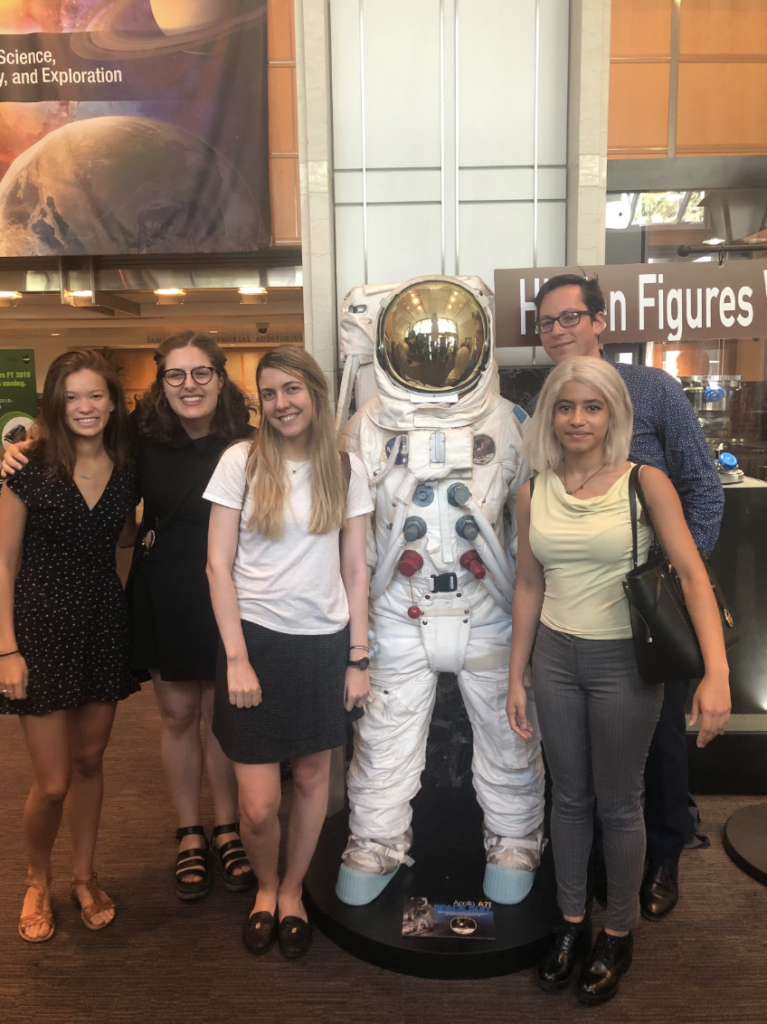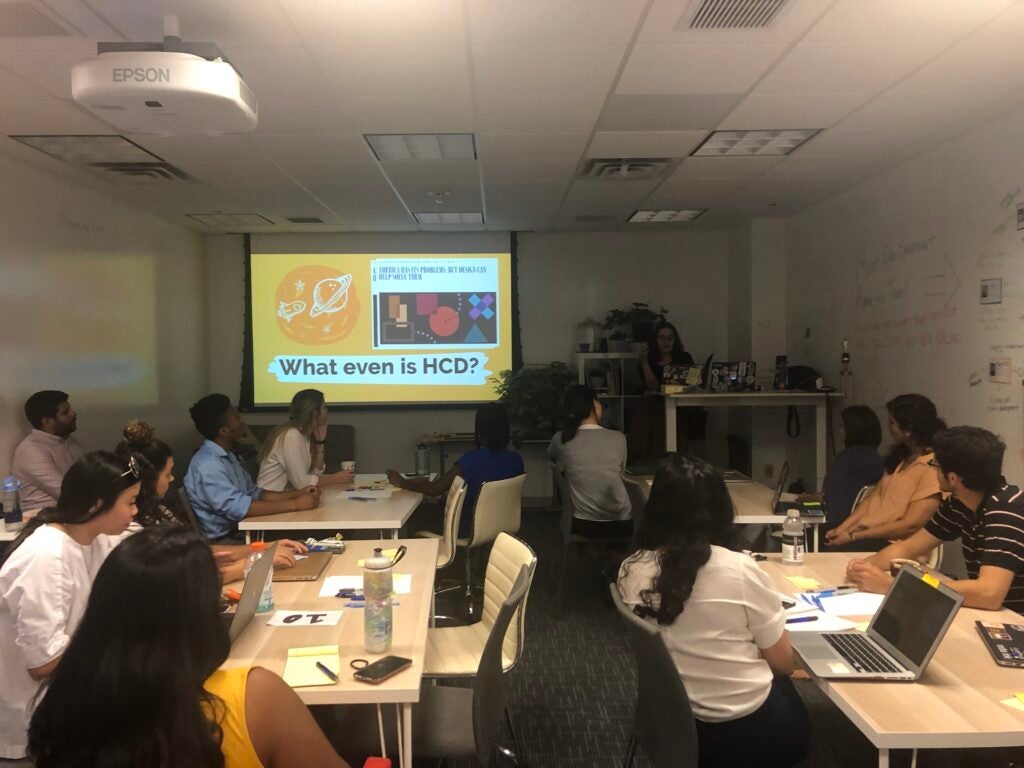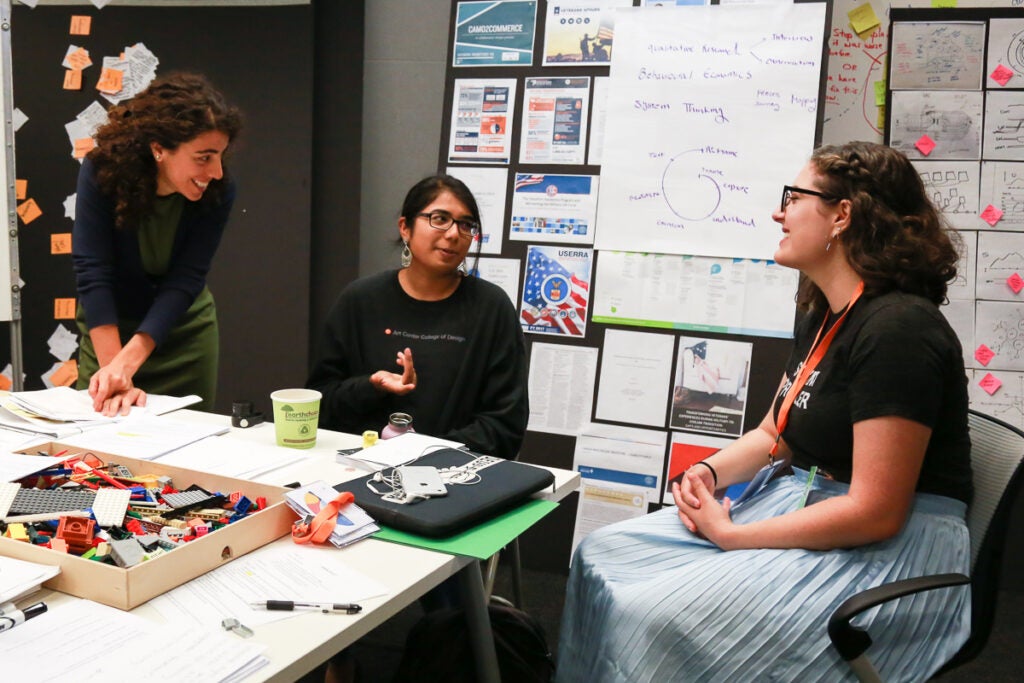Becoming Active Participants in the Data Governance and Digital Services Space
July 2019
It’s been a busy second month for the six student analysts supporting the growing Data + Digital Portfolio at the Beeck Center. They’ve moved from learning to leading — developing their own capstone research projects, learning how to hack bureaucracies, and designing and leading their own workshops.
The Beeck Center’s Data + Digital work includes supporting efforts in the public and private sectors to responsibly share and use data to address some of society’s most challenging issues, as well as creating tangible resources and cultivating the community for government digital service leaders to help them share and scale efforts. Our student analysts are leading research projects around data governance, digital service product rollouts, and service design as a tool for career planning. They have been making the most of opportunities at Georgetown and in Washington, D.C. and we hope you’ll read on for some of their takeaways for the month of July.
—Vandhana Ravi, Data + Digital Program Associate
Learning by Doing: Beeck Center as a Practice Space
The Data + Digital Student Analyst team has only gotten wiser and busier since our last update in June. After spending our first month obtaining knowledge and exposing ourselves to new perspectives, we spent month number two taking on the challenge of putting into practice all that we had learned. We have been busy designing and hosting workshops, delving into research for our capstone projects, and learning how to be creative within constraints. Overall, we have dedicated the month of July to moving past the orientation stage by putting into practice the skills and insights that we have learned, so that we are able to support both the projects that we’ve been leading at the Beeck Center as well as every project we manage throughout our careers.
Research
Research is an important part of our work at Beeck and at Georgetown University, and it is a focus area of all of our projects as student analysts. From frameworks about cross-sector data sharing to helping early-career job seekers navigate civic tech career paths, we’re tackling a wide range of complex issues. Through these endeavors, we are discovering new fields and approaches to problem-solving and finding useful ways to share our findings with practitioners.
To aid us in the development of our research plans, Fellow Christopher Wilson led a workshop providing practical tips and tricks for conducting qualitative research. He shared useful insights on how to organize sources, create bibliographies, manage reading workloads, and how to produce work that is credible, as determined by the standards of our target audiences. We will be applying these skills as we finalize our capstone projects in the weeks ahead and as we continue to conduct research throughout our academic and professional lives.
While many of us are still working on our projects, the first capstone presentation from our team was a workshop on flagging disinformation surrounding the 2020 Census.
Bureaucracy-hacking
July has also been dedicated to learning how to navigate bureaucracy. We found this to be a particularly important skill set to acquire as even the best ideas can be non-starters if the right actors are not on board. Phase one of our bureaucracy-busting education took place at NASA HQ, alongside the Coding it Forward fellows, where former Chief of Staff for the U.S. Digital Service and current Senior Advisor for STEM Transformation at NASA Elaine Ho taught us some of the “secret handshakes” for getting things done in government. We covered everything from understanding stakeholder incentives to the importance of knowing how to leverage a crisis, and left with a better understanding of the roadblocks that can impede well-intentioned change and how to navigate around them.

Beeck Center Student Analysts visit NASA headquarters in Washington, D.C. on July 22, 2019. Photo by Beeck Center for Social Impact and Innovation.
Later in the month, Beeck’s Data + Digital portfolio lead Cori Zarek (aka our boss), built on our bureaucracy-hacking knowledge in a presentation where she challenged us to think about government structure not just as a bothersome barrier but as an important failsafe to government overreach. While it may be frustrating for highly-motivated reformers, the bureaucracy is intentionally careful (and sometimes slow-moving) to avoid potential unintended consequences when rolling out a policy. She took us through some of her experiences getting the policy around the U.S. government’s open-source code hub, code.gov, off the ground, as she stressed the importance of involving stakeholders, running pilots, and including the legal and communications teams every step of the way.
The complexity of pursuing new ideas within structured government hierarchies, while important, has at times felt overwhelming. But thankfully, we had the opportunity to reconvene with our friends at Coding it Forward for part of their Summer of Social Impact event series where panelists encouraged us to pursue careers in the public sector with pitches about mission-driven, high impact projects that will affect the lives of millions of Americans, just one of the many ways the Beeck Center produces impact at scale. But what we really appreciated was how intentional they were about not concealing the complexity of this kind of work — including the advice that the only wrong path one can take into this field is the one that burns you out.
The last phase of our bureaucracy-hacking education in July included attending a Congressional hearing on Modernizing Legislative Information Technologies: Lessons from the States, where witnesses from California, Washington, and Virginia explained to members how their state legislatures are using technology to improve bureaucratic processes. We found it interesting to hear about how operations that seem simple to us, such as checking for scheduling conflicts on an online calendar, are much more complicated to manage within the House of Representatives due to its size and use of outdated software. Although the process of streamlining intra-government communication is far from complete, it’s reassuring that this is a topic of serious discussion, not just in the Beeck Center, but within the halls of Congress as well.
Leading and Facilitation
As part of our efforts to put into practice all that we learned since joining the Beeck Center team, we knew we had to sharpen our presentation skills. If the utilization of technical and design skills in government is going to become a norm, we, as advocates for this method of public service delivery will have to hone our pitch. To get some practice, we created and facilitated a workshop teaching our fellow student analysts the principles of human-centered design. Specifically, we provided our participants with specific strategies that they could take into their Beeck Center portfolio work and their future careers.
Thankfully, as part of the Social Impact Skills workshops that the Beeck Center hosts for student analysts, we had the privilege of learning some public speaking tips and tricks during a workshop led by Beeck Center Fair Finance Director Lisa Hall and Public Eye Communications CEO Joia Nuri before our own workshop. They emphasized the importance of having a connection to your message, and the power of alliteration and storytelling. As part of the Beeck Center’s Discern + Digest lunch series, we also got advice on how to facilitate group dialogues about sensitive topics in a way that creates a space for all participants to meaningfully participate and benefit.
Designing Within Constraints
We put these new presentation and facilitation skills to the test during our own workshop entitled Human-Centered Design: Learning by Doing. Many of us on the Beeck Data + Digital team have at least a cursory knowledge of human-centered design principles, so we wanted to learn more about conducting user research given the constraints of government and social impact work. We explained the principles and methodologies that make up the design process and unpacked how they might be used in the public sector. Afterwards, we led the other Beeck Center student analysts through a hands-on mini design sprint.

Beeck Center Student Analysts lead a human-centered design workshop at the Beeck Center on July 29, 2019. Photo by Dennese Salazar.
Although applying design concepts to government service delivery is a relatively new concept, we’ve learned that, with the right mindset and team, it is possible. One of our student analysts experienced this firsthand when she joined the Lab at OPM for their federal employee summer design school as an assistant design coach. The week was spent working with federal employees on creating innovative, user-centered solutions given a set of financial and political constraints — including designing interfaces to help Navy fleet officers determine if their teams are mission-ready and helping the National Park Service more truthfully depict and showcase the histories of Native Americans.

Beeck Center Student Analyst Jillian Gilburne (right) joins the Lab at OPM’s summer fellows as an assistant design coach during a week-long training for federal employees looking to apply human-centered design techniques to their agencies’ most pressing issues on July 17, 2019. Photo by the Lab at OPM.
What’s Happening in the Field
Civic Tech, as a field, is in a constant state of flux. The sheer volume of events, training, and convenings happening in this space are a testament to this. We urge readers who are interested in these issues to follow our lead and consider the rapidly changing nature of the field as evidence that we are in the midst of something exciting that is both worthy of our attention and in need of our skills and passion.
At Coding it Forward’s Tech Policy 101 event, the importance of this work was further magnified. As Andres Mascumbe, legislative council for Rep. Maxine Waters noted, there is a serious need in Congress to help members quickly understand complex technical topics. He also quoted an often used phrase in the civic tech community, that we must replace our “move fast and break things mindset” with the more intentional “move purposefully and fix things” approach.
Thankfully, we are not alone in our efforts to understand what role we can play in this ever changing line of work. In an effort to recruit and define the roles of young tech talent in government, many organizations are partnering with current and former government employees to brainstorm potential models. We had the privilege of attending one of these convenings where participants, including Beeck Center Fellows, discussed how to redesign government jobs for the 21st century. It became clear that because government agencies, even branches within agencies, all have different approaches to using data, there is no universal answer to what new tech talent will look like. While it’s far from conclusive, we were excited by the potential to create space for a wide range of talent to join government in the coming decades.
Conclusion
As we finalize the second month of our student analyst journey, we are still working (and learning) at the same rapid pace as when we started. We tackled diverse challenges that put our skills to the test, working in horizontal teams and balancing multiple projects, and conducting and presenting our own research to a broader audience in a clear and meaningful way. Above all, we’ve been working together as student analysts and with the entire Beeck Center team to better understand our personal roles in social impact and innovation. This allows us to think about using our existing skills to help support a movement of technologists, designers, and bureaucracy hackers in building a government that truly helps those it has promised to serve.
Student Analysts on the Beeck Center Data + Digital team who contributed to this piece include Margarita Arguello, Kell Crowley, Jillian Gilburne, Alberto Rodriguez Alvarez, Robert Roussel, and Dennese Salazar.